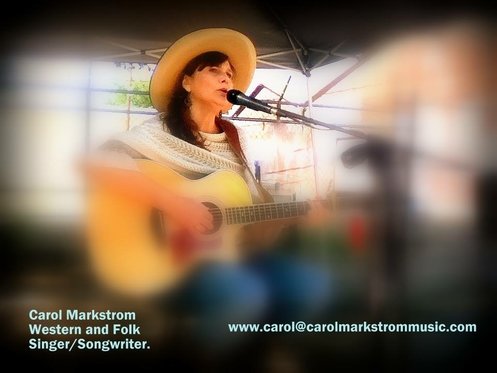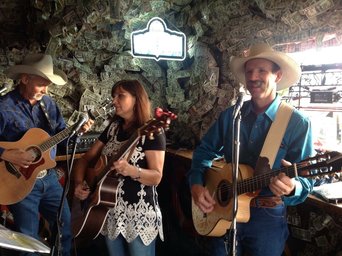I have developed my own strategies for preparing my voice for performances and it’s mostly been through a process of trial and error plus trying out ideas from other singers and performers. I also have to give major credit to my vocal coach in Tucson--Janice Jarrett. I think it is through applying what she taught me, in part, I won the 2015 Female Vocalist of the Year Award from the Academy of Western Artists and once again have been nominated Top 5!
I am fairly disciplined in my preparations because I think every gig deserves the very best from me. So, here are a few of my self-imposed rules and strategies.
Hydration with water is at the top of the list. I increase my water intake on performance days and try to chug 32 ounces or so within 2-3 hours of performing. Janice told me that it takes a few hours for water to hydrate throughout the body’s systems and most particularly the vocal chords. During a performance, I continue to sip on water—no longer large quantities because I don’t want to feel bloated—but I want to keep hydrated. Often venues include free drinks as part of the deal, but I always say I’m a “cheap date” because I’ll only drink water. I avoid cold water and ice because that cools down the vocal chords and limits their flexibility in singing. If my voice is raspy, I may add a slice of lemon or lime to the water to help clear up my throat.
If suffering from a cold or sinus drainage—the show must still go on! Many tea-based remedies have been recommended to me and I’ve tried a few, but I’m not a tea drinker so generally I avoid them. There are other cures and remedies that help and water with lemon is a standard for me in these cases. I also use throat lozenges, but make sure there is no color in them because I don’t want the audience to see a red mouth when I sing. Another very good tool is a throat spray called “Entertainer’s Secret” which can be ordered online. I frequently use that before a performance and during breaks.
I am a coffee drinker, but that’s mostly a morning ritual so not a problem if I’m singing later in the day. Most certainly I avoid carbonated drinks entirely on days I perform—I don’t need to feel bloated. In terms of foods that help or hinder singing, as is the case of most of my musician friends, we do not eat large meals before performing. When venues offer a meal, I wait to eat until after the performance. Yes, I do need energy to perform so protein bars or eating a light meal a few hours before performing is helpful. I avoid eating spicy food, heavily salted foods, or milk-type products such as yogurt or ice cream on days I perform.
Good breath support is critical for sustaining a vocal presence. When I feel my voice is getting tired or sense I’m not singing my best, I re-focus and concentrate on my breath support and let it do its work and that seems to minimize vocal strain. Vocal warm-up exercises are an essential tool for me. Janice recommended a series of recorded exercises which I run through before performing and at other times just to keep my voice in shape. I rehearse my songs and run through the set list ideally several hours before I perform so my voice can rest before I go on stage.
Finally, I protect my vocal chords on performance days by not talking too much and talking at softer levels. I discovered that through overly talking before or even during performances, it seems to take something away from the quality of my singing voice. I don’t have scientific evidence to support this theory, but it has been something learned through trial and error. Janice also alerted me to a tendency of many people today, particularly younger people and even well-known singers, who talk in the fricative which is highly damaging to the vocal chords. What is this? Here is an online definition: "Fricatives are consonants that are formed by impeding the flow of air somewhere in the vocal apparatus so that a friction-sound is produced.” A type of harshness or raspy quality is heard in the voice and I was doing that! So, I have worked to become attuned to that in my own speech patterns and continually remind myself to always speak above the fricative, as well as speak more softly.
So, these are my primary tools for taking care of my voice most particularly on performance days, but other days as well. The voice is an instrument and must be hydrated, exercised, and protected. I’m always looking for suggestions, so am most certainly open to responses to this blog.
I am fairly disciplined in my preparations because I think every gig deserves the very best from me. So, here are a few of my self-imposed rules and strategies.
Hydration with water is at the top of the list. I increase my water intake on performance days and try to chug 32 ounces or so within 2-3 hours of performing. Janice told me that it takes a few hours for water to hydrate throughout the body’s systems and most particularly the vocal chords. During a performance, I continue to sip on water—no longer large quantities because I don’t want to feel bloated—but I want to keep hydrated. Often venues include free drinks as part of the deal, but I always say I’m a “cheap date” because I’ll only drink water. I avoid cold water and ice because that cools down the vocal chords and limits their flexibility in singing. If my voice is raspy, I may add a slice of lemon or lime to the water to help clear up my throat.
If suffering from a cold or sinus drainage—the show must still go on! Many tea-based remedies have been recommended to me and I’ve tried a few, but I’m not a tea drinker so generally I avoid them. There are other cures and remedies that help and water with lemon is a standard for me in these cases. I also use throat lozenges, but make sure there is no color in them because I don’t want the audience to see a red mouth when I sing. Another very good tool is a throat spray called “Entertainer’s Secret” which can be ordered online. I frequently use that before a performance and during breaks.
I am a coffee drinker, but that’s mostly a morning ritual so not a problem if I’m singing later in the day. Most certainly I avoid carbonated drinks entirely on days I perform—I don’t need to feel bloated. In terms of foods that help or hinder singing, as is the case of most of my musician friends, we do not eat large meals before performing. When venues offer a meal, I wait to eat until after the performance. Yes, I do need energy to perform so protein bars or eating a light meal a few hours before performing is helpful. I avoid eating spicy food, heavily salted foods, or milk-type products such as yogurt or ice cream on days I perform.
Good breath support is critical for sustaining a vocal presence. When I feel my voice is getting tired or sense I’m not singing my best, I re-focus and concentrate on my breath support and let it do its work and that seems to minimize vocal strain. Vocal warm-up exercises are an essential tool for me. Janice recommended a series of recorded exercises which I run through before performing and at other times just to keep my voice in shape. I rehearse my songs and run through the set list ideally several hours before I perform so my voice can rest before I go on stage.
Finally, I protect my vocal chords on performance days by not talking too much and talking at softer levels. I discovered that through overly talking before or even during performances, it seems to take something away from the quality of my singing voice. I don’t have scientific evidence to support this theory, but it has been something learned through trial and error. Janice also alerted me to a tendency of many people today, particularly younger people and even well-known singers, who talk in the fricative which is highly damaging to the vocal chords. What is this? Here is an online definition: "Fricatives are consonants that are formed by impeding the flow of air somewhere in the vocal apparatus so that a friction-sound is produced.” A type of harshness or raspy quality is heard in the voice and I was doing that! So, I have worked to become attuned to that in my own speech patterns and continually remind myself to always speak above the fricative, as well as speak more softly.
So, these are my primary tools for taking care of my voice most particularly on performance days, but other days as well. The voice is an instrument and must be hydrated, exercised, and protected. I’m always looking for suggestions, so am most certainly open to responses to this blog.


 RSS Feed
RSS Feed